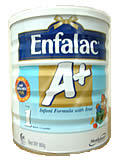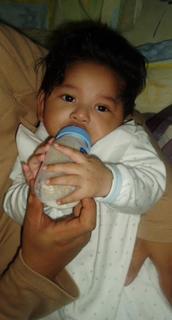What is Reflux?
My baby spits up all the time. . . My child won't gain weight. . . I have an unhappy toddler. . . My child has a chronic cough . . . wheezing . . . recurrent pneumonia . . . My infant cries and cries . . . any one of these symptoms alone may indicate a common condition called Gastroesophageal Reflux Disease (GERD).
Most babies "spit up" after they eat, but some babies spit up so much so frequently that they are diagnosed with Gastroesophageal Reflux (GERD). The definition of reflux is splashing or pushing of stomach contents backwards up into the esophagus, and sometimes, out the mouth or nose. All of us have some reflux every day. Most of us aren't aware of it when it happens. One important thing to remember, over 90% of Children who have reflux will outgrow it.
How Do I Know if My Child Has Reflux?
- Baby has poor weight gain
- Baby vomits frequently (more than once or twice daily)
- Baby has recurrent pheumonias
- Baby shows discomfort eating (i.e. refusal to eat, stiffens up, arches back (opisthotonus), tries to push away from the bottle)
- Persistant Hiccups
- Persistant Cough
- Chronic nasal and/or sinus congestion (from aspiration)
- Frequent Choking episodes
- Along with other symptoms: one hour, or more of crying a day
- "Sour" breath
- Child complains of burning pain in the chest area
- Complains that eating hurts Chronic reflux can result in Esophagitis. This is caused by erosion to the esophagus from the acid in the vomit. Signs can range from pain during feedings (a baby may seem eager for a bottle, but after a sip suddenly refuse to take any more) to blood in the vomit. If this continutes for a long period of time it can cause scarring on the esophagus and rarely, it can lead to Barretts Esophagus or even Cancer. It is important to diagnose reflux early and when necessary treat it medicinally. Reflux may be diagnosed based on the description of the Child's behavior. Often the doctor will order tests to confirm the diagnosis.
Tests for determing Reflux
There are tests your doctor can order to accurately diagnose reflux. The most common is an upper GI series (this will check for structural abnormalities, while important, it is not uncommon for reflux to not be seen on this test), a milk scan which is similar to a UGI, however it lasts longer and often shows reflux more clearly, another more sensitive is a pH probe (this test detects normal and abnormal reflux). There are more tests (listed in the testing section) for determing the severity of the damage done from reflux as well as whether there are other systems affected by reflux such as the respirat ory system.
What is the Cause of Reflux?
Reflux is usually considered to be incoordination of the upper digestive system. Often resulting from an underdeveloped digestive tract. Which means the good news is that most babies are expected to outgrow reflux. Recently studies have shown for many families reflux is genetic. (see reflux.org ). Most babies do have some degree of reflux, and just because there is one child in a family with moderate to severe reflux does not guarantee that there will be another.
What is the Treatment for Reflux?
Treatment of Reflux depends on it's severity. In mild cases thickening of the formula and keeping the child upright is enough (usually when thickening the milk rice cereal is tried first, but more often than not it is too difficult for the child to digest, oatmeal cereal seems to be tolerated much better). Ideally, children are kept upright while sleeping as well Through elevation of the head of the crib, either by physically adjusting the crib or by purchasing a "wedge" (ask your doctor for further information on this). Also, your child can sleep in an infant seat or a 'bouncy chair'.
If this is not enough then medications are commonly prescribed (see medication section). One type of medication is used to reduce the acid the stomach produces (i.e. Zantac, Tagament, Prilosec, Prevasid). Another type of medication used improves the function (or motility) of the stomache and digestive system by helping it to empty better and reflux less (i.e. Reglan). Other medications used are Maalox, Mylanta (or similar O.T.C. ) which coates and temporarily relieves the discomfort of reflux, and Carafate which coates and allows the healing of the stomach and esophagus while preventing further damage. Most often Gastroenterologists reccomend that Adult Strenght Mylanta/Maalox be given rather than Children's Mylanta which has been shown to aggrivate reflux, ask your GI for more information. If, after careful consideration, the medication fails then surgical treatment may be indicated.




1 comments:
drewreeny On health problem like Acid Reflux Baby, I hope I am not getting off topic here but Gastroesophageal reflux disease, commonly referred to as GERD, or acid reflux, is a condition in which the liquid content of the stomach regurgitates (backs up, or refluxes) into the esophagus.I have suffered from this myself The liquid can inflame and damage the lining of the esophagus although this occurs in a minority of patients.Anyone who has also suffered from acid reflux knows the pain one feels.I have a site about this at Acid Reflux Baby. Anyway enjoyed your site will return soon.
Post a Comment